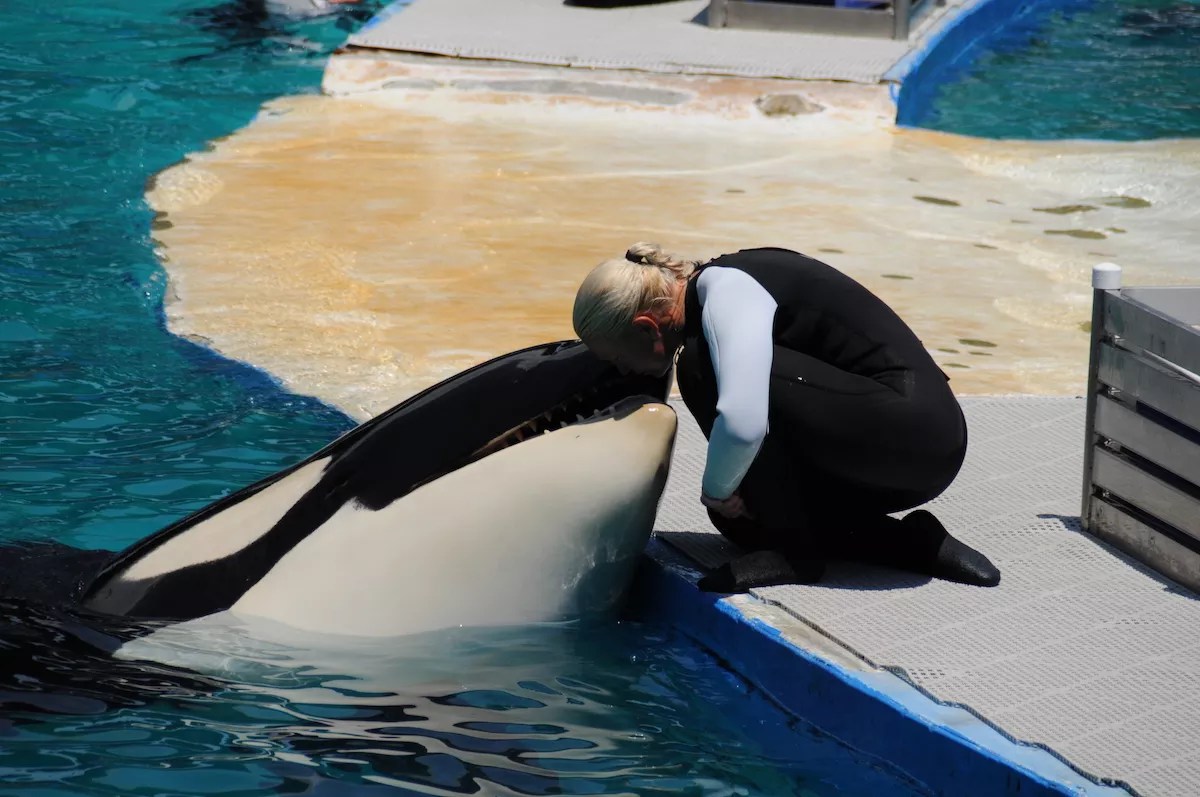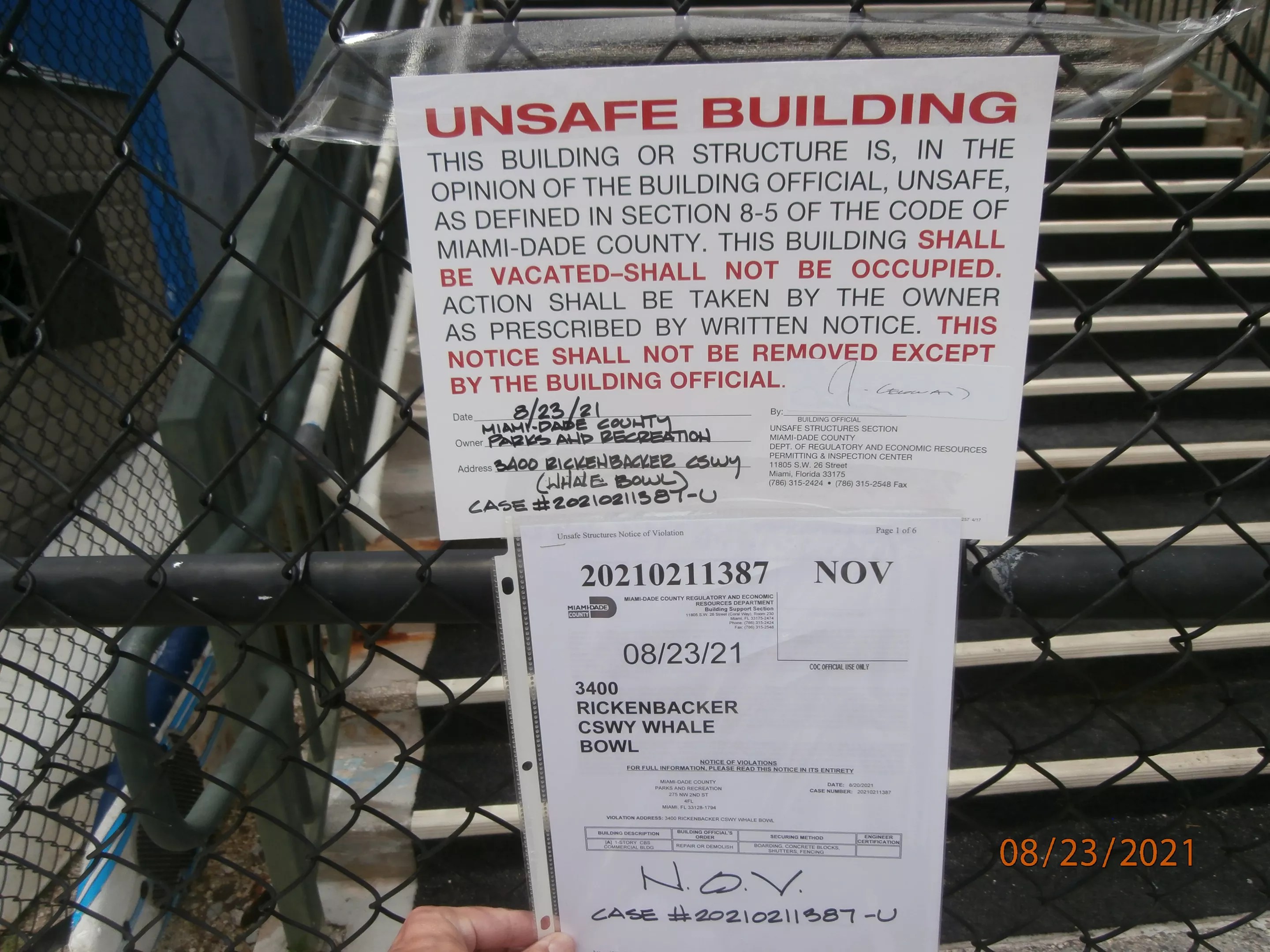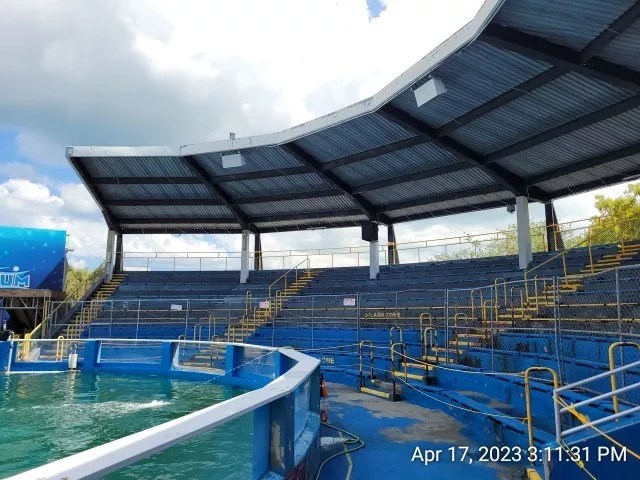
Photo by Andy Blackledge via Flickr

Audio By Carbonatix
On August 18, as the sun set over Virginia Key, Lolita the orca’s body was harnessed and wrapped in a white shroud at Miami Seaquarium. A flock of birds flew over the remains of the 7,000-pound black-and-white whale while the park staff looked on mournfully.
After more than five decades in captivity – and amid a headline-grabbing project to relocate her to an enclosure in her native Salish Sea – the beloved orca (also known as Tokitae or Toki) died at the estimated age of 57. Her body was loaded onto a truck to be transported to the University of Georgia for a necropsy to determine the cause of death, initially attributed to kidney dysfunction.
In the wake of her death, the state of her cramped and crumbling tank, where she had been confined since 1970, has prompted questions about whether her living conditions were to blame for her failing health. A former Seaquarium veterinarian, Jenna Wallace, tells New Times that persistent water quality issues and a reduction in Lolita’s diet by more than 25 percent likely played a role in her initial deterioration.
A debilitating chronic infection left Lolita in a fragile state over the past two years, by all accounts. Though the Seaquarium and its vets at times suggested the whale was on the mend, health reports reviewed by New Times show that in the months before Lolita perished, she was still struggling and receiving high doses of antibiotics while battling infectious disease, the origins of which doctors had trouble pinpointing.
Miami Seaquarium beamed about Lolita’s health three days before she died, saying she was “very stable.”
While the probe into what killed Lolita 53 years into her captivity is ongoing, federal inspection data, her health reports, and interviews with the former Seaquarium veterinarian make it clear that the whale was living in an antiquated, deteriorating tank with an outdated water filtration system, which the park’s new owner, Dolphin Co., rushed to update after taking over the venue in 2022.
Tank Crumbling
Lolita’s living conditions fell under public scrutiny when a 2021 report from the United States Department of Agriculture (USDA) came to light, painting a dire picture of the whale’s care under Miami Seaquarium’s previous owner, Palace Entertainment: tank disrepair, foul fish food, and major problems with water quality.
The feds noted that the facility failed to monitor and maintain the chlorine levels in Lolita’s pool. It was a delicate balance – too much chlorine could cause chemical injury, while not enough could allow harmful pathogens to flourish in the small tank. The tank had a recirculating water system, where disinfectants were essential to remove fecal contaminants and pathogens.
Lolita displayed signs of potential chlorine injury around her eyes in the spring of 2021, an ailment preceded by a tank pump breakdown, according to the USDA report.
Wallace, a veterinarian who worked at Miami Seaquarium at the time, tells New Times that the health effects of the outdated water treatment were exacerbated by the Seaquarium’s move to reduce the whale’s diet to roughly 120 pounds daily. Wallace says that solid food intake affects orcas’ hydration, as the whales are thought to absorb water through food digestion.
“Lolita was always on a 165-pound-a-day diet. I believe her veterinary team reduced her to such a low diet that she was underfed and dehydrated chronically,” Wallace says.
The federal inspection reflected Wallace’s concerns about the park reducing the whale’s feeding volume and its decision to continue giving her an allegedly foul shipment of fish – all without approval from the veterinarian who had been treating her since 1997, according to the report.
“The decisions to decrease Toki’s base and continue to feed poor quality capelin to park animals were…made without the [attending veterinarian’s] approval,” the report reads.
The longtime vet, Magdalena Rodriguez, was fired in June 2021 after alleged fallout from her relaying her safety concerns about Lolita and other marine mammals to the USDA. Wallace says she was pushed out of her job at the Seaquarium that summer after supporting Rodriguez and the USDA investigation.
In response to the backlash over the findings, the park said it stood by the quality of its animal care and had a track record of successful inspections. “Our veterinarians and animal care specialists are fully dedicated to delivering the best care to all of our animals,” Miami Seaquarium said.

Miami-Dade County inspectors posted an unsafe-building notice at Miami Seaquarium’s Whale Bowl stadium in 2021.
Photo by Miami-Dade County
The whale auditorium, which dates back to 1970, was crumbling as the staff drama unfolded. Chunks of deteriorating paint flaked off into Lolita’s tank, and “a section of pool laminate on one side of the slide-out area on the island was missing, revealing the cement underneath,” the USDA reported.
Building inspectors from Miami-Dade County issued an unsafe-structure notice for the stadium in August 2021 and shut down public access to the whale venue, noting that there was structural damage to a joist, accompanied by corrosion around beams supporting the grandstand. At a subsequent county meeting, a building department board member, Marco Gorrin, was at a loss, asking “how the structure was allowed to deteriorate to this extent,” the board minutes show.
A few months after the USDA’s findings were made public, Lolita’s health collapsed, according to a veterinary assessment.
Ailing Whale
Eduardo Albor’s Dolphin Co., an amusement company with marine parks spread across eight countries, announced in August 2021 that it was acquiring Miami Seaquarium from Palace Entertainment. It took over operations of the Seaquarium in March 2022 and officially retired Lolita from public performance while her health was failing and the whale stadium was under review by the Miami-Dade County unsafe-structures board.
James McBain, a retired veterinarian brought in by the Seaquarium to monitor Lolita, said that the whale’s caretakers were struggling to find the source of her chronic infection.
“Due to size, killer whales present diagnostic challenges that are not an issue with smaller species. What we now know is that her infection was well established and will likely require prolonged therapy,” the doctor wrote in June 2022.
Monthly health reports issued by McBain call into question whether Lolita ever truly recovered. The infection persisted throughout 2022, and she had ups and downs, sometimes losing her appetite, appearing listless, and teetering on the verge of fatal illness. She took a turn for the worse in September 2022 but seemed to recover after a new antibiotic was added to her regimen.
As Lolita clung to life, Dolphin Co. undertook a project to upgrade the outdated water filtration system in her tank by changing the filter media and replacing the chlorination system with ozone, another disinfectant, which McBain said would provide her with healthier and more natural water.
“The Dolphin Company assumed ownership of Miami Seaquarium in March of 2022. Since then, more than $500,000 has been invested, including new chillers, filter media, and an ozone generator. All the while, we continued our unwavering commitment to her well-being,” the company said in a statement to New Times.
Her tank was consistently tinged green with algae growth in the absence of the chlorination that had kept the water looking clear and blue during her performance days. Dolphin Co. maintained that the algae was not harming the whale, believed to be in her late 50s, an advanced age for an orca.
Among multiple planned changes, McBain noted that staff planned to bring down the pool temperature to around 59 degrees to keep the whale comfortable.
Wallace tells New Times that ozone can be an effective disinfectant, but that levels must be tightly monitored to ensure it has the desired effect.
“Toki had strong levels of chlorine in her pool forever. Once you take that disinfectant away, she may then be prone to pathogens in the water. We have had problems at other parks where the ozone was not entirely effective,” Wallace says.
By the summer of 2023, the ozonation system had replaced chlorine as the disinfectant in the pool.

Lolita, AKA Tokitae, had been in captivity since she was captured as a calf in Puget Sound in 1970.
Photo by Leonardo DaSilva via Flickr
Freedom in Sight
Hope sprung in March 2023 that Lolita might be released from the Miami Seaquarium.
The whale’s health reports had shown signs of progress, and the Seaquarium announced that it had joined forces with nonprofit Friends of Toki and NFL team owner Jim Irsay to relocate the aging whale to a yet-to-be-built sanctuary in the Salish Sea off the coast of Washington state. Albor said he was committed to returning the whale to her home waters.
Friends of Toki said that although permitting and logistics would be challenging, it planned to resettle Lolita by mid-2025. The project was estimated to cost roughly $15 million.
Outspoken activist and former animal trainer Phil Demers denounced the plan, saying that Lolita was sicker than the public was being led to believe. He warned that Lolita’s conditions were reminiscent of the tank where Kiska, Canada’s last captive orca, was confined.
While a plan to relocate her was in the works, Kiska died at Marineland in Ontario of a fatal bacterial infection in March 2023 – a reminder of how fragile older, captive orcas’ health can be. The Seaquarium’s revelation of the project to relocate Lolita to a marine sanctuary came less than three weeks later, fueling speculation that the Miami park’s announcement was hastened by Kiska’s death.
“I’m seeing Toki in the same condition Kiska was in, and I’m seeing the exact same messages being repeated,” Demers, a longtime Marineland employee, told New Times in March 2023. “We can’t continue to wait for a whale utopia to be built and wait for optimal conditions for her to enter this utopia…The longer we wait for perfection, the likelier it becomes that she is going to die.”
The activist, known as the “Walrus Whisperer” for the extended battle he waged to free a walrus named Smooshi from Marineland, is currently steeped in a legal tiff with Miami Seaquarium over its claims that he trespassed by flying drones over the park to secure footage of Lolita in her tank.
Demers – whose social media features him leading protests, sipping cocktails, and mooning a camera on the beach – claims many marine theme parks, including Miami Seaquarium, have put off pricey upgrades to their aging animal enclosures to avoid punching a hole in profits. As Demers notes, several parks were built more than a half-century ago. (Miami Seaquarium opened on Virginia Key in 1955, and the whale stadium was later built in 1970, according to Sandra Pollard, who authored a book on orca captivity.)
“Life changes and evolves, right? You gotta adapt with it,” Demers says. “Miami Seaquarium didn’t. They’re archaic, and that’s the problem. You can’t catch up to 2023 if you’re built in 1970.”
Demers says federal oversight of Lolita was lacking after the exhibition license for the whale was pulled in 2022, and she fell out of the public eye.
“I think you have to look at some of the government agencies that allowed this torture to ensue without any oversight, without any protection whatsoever, even though they have mandates to do so,” Demers says.
Last Days
Before Lolita died, the final monthly veterinary report hinted that something was awry, but it offered no indication she was fatally ill. The report said she was suffering from an abdominal illness similar to what she had experienced the previous month.
McBain and veterinarian Stephanie Norman noted the Biscayne Bay source water feeding her tank was scorching hot this summer but that staff had added the two large portable chiller units to the mix, keeping the water at a cool temperature in the 50s.
“The new ozone unit has allowed the team to discontinue chlorine as a disinfectant,” the July report reads. “Round-the-clock maintenance of life support and water quality is being well managed by staff.”
“She is still fighting infection, but we are seeing continued incremental improvements to each of the parameters we are monitoring,” the report states.
In recent weeks, Lolita was undergoing training in preparation for her planned transport to the Pacific Northwest, though the envisioned sanctuary was far from being built and the project was still in its infancy.
On August 15, three days before the whale died, the Seaquarium announced it would provide a new round of updates on her health and trip preparation. That same day, Albor of Dolphin Co. said the whale was “in the best health condition on record for years.”
After Lolita passed away, the marine park stated that her health had declined precipitously over two days while veterinarians scrambled to treat her. The facility said she suffered fatal complications from suspected renal issues, without specifying whether they were related to her chronic infection.
A timetable for Lolita’s necropsy results has not been released. The marine park said in a statement that it will soon announce the details of a “ceremony to bid farewell to beautiful Lolita.”
The last orca to die at the Seaquarium was Lolita’s former tank mate Hugo, who perished around age 14 in 1980 of a brain aneurysm, according to his necropsy report. He had been known to aggressively smash his head against the sides of the 35-by-80-foot pool, at one point cracking the glass and slicing off a piece of his nose.

The Whale Bowl stadium housing Lolita the orca is vacant in a 2023 photo by Miami-Dade County inspectors.
Photo by Miami-Dade County